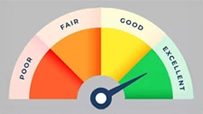Top 10 Reasons Why Your Business Loan Application Was Rejected
September 03, 2025

Rajesh, a passionate entrepreneur from Pune, had been running a small garment business for five years. With growing demand, he decided to expand his operations. Confident about his steady revenue, he applied for a business loan. However, his application was rejected, leaving him frustrated and confused. Like Rajesh, many business owners face rejection without understanding why. This blog will dive deep into the common reasons why business loan applications get rejected and how you can improve your chances of approval.
1. Poor Credit Score
Your credit score is often the first thing banks evaluate. A low credit score signals financial irresponsibility, making banks hesitant to approve your loan. This can result from late payments, high credit utilization, or previous defaults.
How to Fix It:
- Pay bills on time.
- Reduce outstanding debts.
- Regularly check your credit report for errors and get them corrected.
2. Insufficient Business Revenue or Cash Flow
Banks need assurance that your business generates enough income to repay the loan. Inconsistent cash flow or low revenue may raise red flags.
Example: Consider Priya, who owns a small cafe in Bangalore. Due to seasonal sales, her cash flow was inconsistent. When she applied for a loan, the bank doubted her repayment capability.
How to Fix It:
- Maintain a steady cash flow.
- Diversify income sources.
- Present detailed financial statements showing revenue trends.
3. Incomplete or Inaccurate Documentation
Submitting incomplete or incorrect documents can lead to immediate rejection. Banks rely on these documents to assess your business's health.
Common Mistakes:
- Missing financial statements
- Incorrect business registration details
- Outdated tax returns
How to Fix It:
- Double-check all documents before submission.
- Consult a financial advisor for guidance.
- Keep financial records up-to-date.
4. Lack of Collateral or Security
For secured loans, banks require collateral as security. If you cannot provide valuable assets, banks may reject your application.
How to Fix It:
- Explore unsecured loan or Government schemes.
- Offer personal guarantees if possible.
- Build business assets over time.
5. High Existing Debt
A high debt-to-income ratio can make banks wary. If your business is already burdened with loans, it signals financial strain.
How to Fix It:
- Repay smaller debts before applying for a new loan.
- Consolidate debts for easier management.
6. Unclear Business Plan
An unclear or unrealistic business plan can deter banks. They need to understand how the loan will be used and how it will generate returns.
How to Fix It:
- Create a detailed, realistic business plan.
- Highlight market research, financial projections, and growth strategies.
7. Limited Business Experience
Start-ups or businesses with inexperienced management often face higher rejection rates. Banks prefer applicants with proven business experience.
How to Fix It:
- Gain industry experience or partner with experienced professionals.
- Start small and scale gradually.
8. Industry Risk
Certain industries are considered high-risk due to market volatility or regulatory issues. For example, nightlife or construction industries often face stricter scrutiny.
How to Fix It:
- Present strong risk mitigation strategies.
- Highlight industry growth trends in your proposal.
9. Mismatch Between Loan Amount and Business Needs
Requesting a loan amount that doesn't align with your business size or needs can trigger doubts.
How to Fix It:
- Apply for an amount justified by your business plan.
- Break down how each rupee will be utilized.
10. Tax Irregularities
Banks review tax filings to assess your financial discipline. Irregular or non-compliant tax filings can lead to rejection.
How to Fix It:
- File taxes on time.
- Maintain transparent financial records.
Final Thoughts
Getting a business loan rejection can be discouraging, but understanding the reasons behind it can help you bounce back stronger. By addressing these common pitfalls—improving your credit score, maintaining steady cash flow, and presenting a clear business plan—you can significantly increase your chances of approval. Learn from every setback, and let it guide you towards financial success.
Take your business to the next level with Ujjivan Small Finance Bank MSME Loans. We have a host of MSME products tailored for your unique business growth needs. Additionally, we offer MSME Overdraft facilities for urgent business capital requirement. Browse through our suite of products and apply today!
Disclaimer:
The contents herein are only for informational purposes and generic in nature. The content does not amount to an offer, invitation or solicitation of any kind to buy or sell, and are not intended to create any legal rights or obligations. This information is subject to updation, completion, amendment and verification without notice. The contents herein are also subject to other product-specific terms and conditions, as well as any applicable third-party terms and conditions, for which Ujjivan Small Finance Bank assumes no responsibility or liability.
Nothing contained herein is intended to constitute financial, investment, legal, tax, or any other professional advice or opinion. Please obtain professional advice before making investment or any other decisions. Any investment decisions that may be made by the you shall be at your own sole discretion, independent analysis and evaluation of the risks involved. The use of any information set out in this document is entirely at the user’s own risk. Ujjivan Small Finance Bank Limited makes no representation or warranty, express or implied, as to the accuracy and completeness for any information herein. The Bank disclaims any and all liability for any loss or damage (direct, indirect, consequential, or otherwise) incurred by you due to use of or due to investment, product application decisions made by you on the basis of the contents herein. While the information is prepared in good faith from sources deemed reliable (including public sources), the Bank disclaims any liability with respect to accuracy of information or any error or omission or any loss or damage incurred by anyone in reliance on the contents herein, in any manner whatsoever.
To know more about Ujjivan Small Finance Bank Products Visit:"https://www.ujjivansfb.in"
All intellectual property rights, including copyrights, trademarks, and other proprietary rights, pertaining to the content and materials displayed herein, belong
to Ujjivan Small Finance Bank Limited or its licensors. Unauthorised use or misuse of any intellectual property, or other content displayed herein is strictly prohibited and the same is not intended for distribution to, or use by, any person in any jurisdiction where such distribution or use would (by reason of that person’s nationality, residence or otherwise) be contrary to law or registration or would subject Ujjivan Small Finance Bank Limited or its affiliates to any licensing or registration requirements.
FAQs
1. What is the minimum credit score required for a business loan in India?
Most banks prefer a credit score of 700 or above.
2. Can start-ups get business loans easily?
Start-ups may find it challenging but can explore government schemes or unsecured loans.
3. What documents are essential for a business loan application?
Typically, financial statements, business registration proof, tax returns, and bank statements are required.
4. How does cash flow impact loan approval?
Consistent cash flow assures banks of your repayment ability.
5. Can I get a loan without collateral?
Yes, unsecured business loans are available but may come with higher interest rates.
6. How do I improve my chances of getting a loan for a risky industry?
Showcase risk management strategies and detailed market research.
7. Is a business plan necessary for a loan application?
Yes, a clear business plan demonstrates how you will use the funds and generate returns.
8. Can existing debts affect loan approval?
High existing debts can lower your chances; it's best to clear smaller debts first.
9. How long should my business operate before applying for a loan?
Banks usually prefer businesses with at least 2-3 years of operations.
10. What government schemes support small businesses in India?
Schemes like Mudra Loans, Stand-Up India, and CGTMSE support small businesses.
Latest Blogs

APK Fraud: How One Wrong Download Could Empty Your Bank Account
May 13, 2025
Picture this. You’re sipping your evening tea when your phone rings.

Gold Loan LTV Ratio Explained (75% to 85%): What It Means for Borrowers
March 20, 2025
In June 2025, the Reserve Bank of India (RBI) introduced a significant relaxation for gold loan borrowers: the maximum Loan-to-Value (LTV) ratio for loans below ₹2.5 lakh was raised to 85%, up from the long-standing cap of 75%. Loans between ₹2.5 lakh and ₹5 lakh can now go up to 80%, while loans above ₹5 lakh continue under the 75% ceiling.

Good Debt vs Bad Debt: Learn the Difference
August 13, 2025
Every month, millions of Indians wait for the familiar debit alert, an EMI deducted from their account.

Got a Tax Refund? 5 Smart Ways to Put Your 2025 Refund to Work
August 13, 2025
For many taxpayers, there’s a unique sense of relief when a tax refund arrives.

Credit Score Not Improving? 5 Mistakes You Might Be Making
August 13, 2025
For most of us, a credit score feels like a silent judge sitting in the background of our financial lives.




